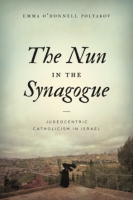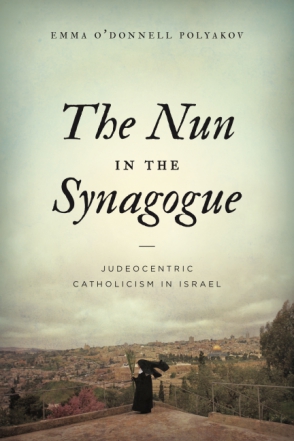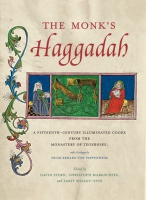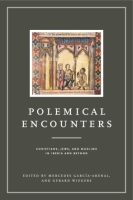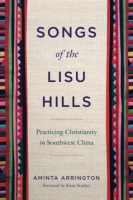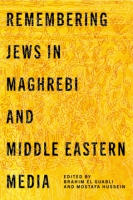The Nun in the Synagogue
Judeocentric Catholicism in Israel
Emma O’Donnell Polyakov
“In an astute analysis of philosemitism and its relationship with antisemitism, the author distinguishes Judeocentricity from these more classic forms of obsessive focus on Jews.”
- Description
- Reviews
- Bio
- Table of Contents
- Sample Chapters
- Subjects
This book is a case study in Catholic perceptions of Jews, Judaism, and the state of Israel during a time of rapidly changing theological and cultural contexts. In it, Polyakov listens to and analyzes the stories of individuals living on the border between Christian and Jewish identity—including Jewish converts to Catholicism who continue to harbor a strong sense of Jewish identity and philosemitic Catholics who attend synagogue services every Shabbat. Polyakov traces the societal, theological, and personal influences that have given rise to this phenomenon and presents a balanced analysis that addresses the hermeneutical problems of interpreting Jews through Christian frameworks. Ultimately, she argues that, despite its problems, this movement signals a pluralistic evolution of Catholic understandings of Judaism and may prove to be a harbinger of future directions in Jewish-Christian relations.
Highly original and methodologically sophisticated, The Nun in the Synagogue is a captivating exploration of biographical narratives and reflections on faith, conversion, Holocaust trauma, Zionism, and religious identity that lays the groundwork for future research in the field.
“In an astute analysis of philosemitism and its relationship with antisemitism, the author distinguishes Judeocentricity from these more classic forms of obsessive focus on Jews.”
“The book is well-written and well-researched. It poignantly and pointedly tells the story of the precarious birth of Judeocentric Catholicism in the land of Israel.”
“Through numerous personal interviews, the author makes all of this come to life so that readers, for a time, can feel that they, too, are in Israel talking with these remarkable Catholics who have dedicated their lives to bettering relations between the Church and the Jewish people. I highly recommend this book to both Catholics, who can see their own faith in a new and deepened way, and to Jews interested in the dialogue who wish to understand its profound effects upon the Catholics who engage in it.”
“A fascinating, intelligent, and sensitive presentation of Judeocentric views shared by Roman Catholic priests, nuns, and monks living in the State of Israel. Necessary reading for those interested in Jewish-Catholic relations, ethnography, and the intertwined phenomena of antisemitism and philosemitism.”
“In this engaging volume, Polyakov delves into the religious identity of a small group of Roman Catholics, some converts from Judaism, who, while living in the State of Israel, attempt to integrate their own identities, the impact of the Shoah, and the teachings of a post-conciliar Church. The varied responses to these influences are fascinating in their own right and raise important questions for our understanding of Jewish-Christian relations today.”
“This pathbreaking, important book shows the way along the thorny borders of religious identity, pointing to new and more properly complicated understandings. Emma O’Donnell Polyakov—an elegant writer, a diligent scholar, an empathetic interviewer—proves to be a most reliable guide: trustworthy, alive to hazards, an exemplar of hope on one of history’s most challenging journeys.”
“The two thousand years of interaction between Jews and Christians have had many twists and turns, but perhaps none as distinctive as what Emma O’Donnell Polyakov calls a ‘Judeocentric Catholicism’ alive today in the State of Israel. Indeed, the spiritualities she describes here would have been impossible before the existence of a nation with a majority Jewish population and the appearance, after the Shoah, of Catholics determined to respect and learn from Jews and Judaism. Her qualitative study testifies to the new era of Christian-Jewish understanding in which we are blessed to live.”
“This is an original and important study constituting a phenomenology of a small number of Catholics committed to repairing Catholic-Jewish relations in modern-day Israel. Polyakov’s sensitive interviews and engaging prose open up a challenging landscape: dual identity, Jewish-Catholic relations, and the impact of the Holocaust on Catholic identity are all explored. This book is a significant contribution to ethnography, theology, and the study of religion.”
Emma O’Donnell Polyakov is Assistant Professor of Religious and Theological Studies at Merrimack College, the author of Remembering the Future: The Experience of Time in Jewish and Christian Liturgy, and the editor of Antisemitism, Islamophobia, and Interreligious Hermeneutics: Ways of Seeing the Religious Other.
Acknowledgments
Prologue
Part 1: The Jewish People Through a Christian Lens
1. Behind the Monastery Walls
2. A New Philosemitism
3. Christian Constructions of the Jew
4. Christian Responses to Israel
Part 2: A Judeocentric Catholicism
Portrait: Sr. Talia
5. The “Mystery of Israel”
Portrait: Sr. Marie Yeshua
6. Precedents and Predecessors
Portrait: Sr. Anne Catherine
7. A Mission Reversed: The Sisters of Sion
Portrait: Sr. Carmen
8. A Christian Aliyah?
Portrait: Fr. Olivier
Part 3: Religious Identity After the Holocaust
9. Navigating Jewish-Christian Identity
Portrait: Sr. Regine
10. Conversion, Belonging, and Holocaust Trauma
Portrait: Sr. Paula
11. Theology After the Holocaust
Portrait: Sr. Michaela
Part 4: Praying for the Jews
Portrait: Sr. Rebecca
12. Interreligious Dialogue and Monasticism
Portrait: Fr. Jacques
13. Between the Synagogue and the Church
Portrait: Sr. Gemma
14. The Problematics of Prayer for the Jewish People
Portrait: Sr. Maureena
Epilogue
Notes
Bibliography
Index
Download a PDF sample chapter here: Chapter 1
Mailing List
Subscribe to our mailing list and be notified about new titles, journals and catalogs.
